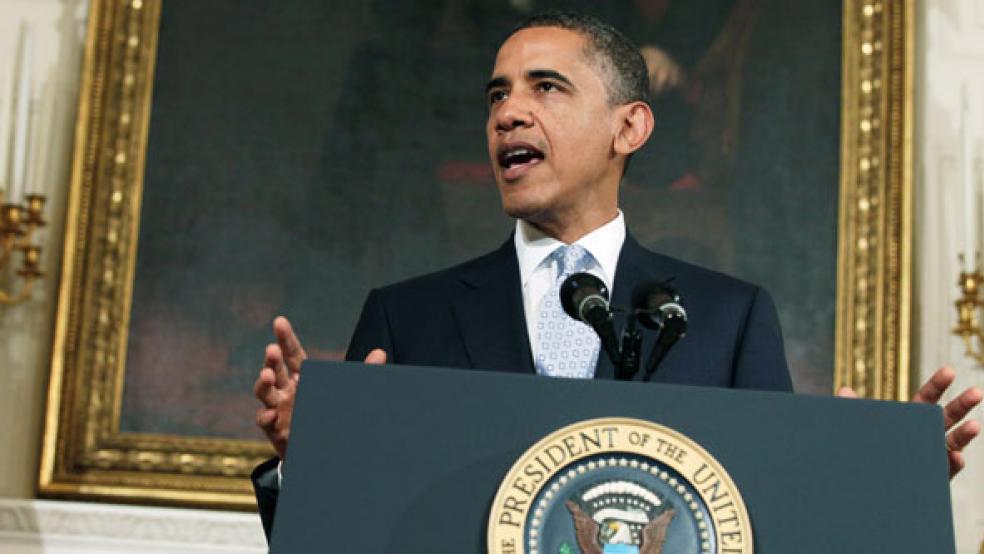President Obama sought to calm the nation and roiling markets Monday afternoon following Standard & Poor’s downgrade of the U.S. government’s AAA credit rating, saying that the country’s debt and financial problems were “eminently solvable” and calling on Republicans to join with him in devising the next round of spending cuts.
“I know we are going through a tough time right now,” Obama said from the White House while the Dow Jones Industrial Average was plummeting by more than 500 points. “Markets will rise and fall, but this is the United States of America. No matter what some agency may say, we’ve always been and always will be a Triple-A country.”
Worldwide markets plunged on Monday as intensifying fears about the global economy drove panicked selling by investors. Those sharp declines on Wall Street and in European and Asian markets followed emergency action in Europe to help contain a debt crisis engulfing Italy and Spain, the continent’s fourth- and fifth-largest economies.
Obama asserted that the S&P downgrade had more to do with concerns about the weeks of Democratic-Republican wrangling over raising the debt ceiling than doubt about the government’s ability to pay its debts. Citing comments by financier Warren Buffet and other economic experts, Obama said “the markets continue to believe our credit rating is Triple A.”
“That doesn’t mean we don’t have a problem,” he added. “The fact is we don’t need a rating agency to tell us we need a balanced long-term approach to deficit reduction.”
In announcing the downgrade, S&P cited the U.S. debt burden and political paralysis as reasons behind its decision to remove the nation’s sterling AAA rating. The Obama administration blasted the decision, saying it was based on faulty logic and math – including a $2 trillion overstatement of long term debt that S& P was forced to correct before issuing its statement late Friday.
John Chambers, managing director at Standard and Poor's, dismissed the criticism that the debt miscalculation undermined the credit ratings company’s credibility. “This is an issue, a technical issue between what sorts of baselines you take. Are you going to take a baseline that assumes that existing law remains in place, which means the lapsing of the 2001, 2003 tax cuts, that the AMT is applied to people who make, you know, $80,000 a year or more, that the clawback takes place on the Medicare payments every year? Or whether or not you relax those assumptions, and which scoring done by the CBO would be most consistent," Chambers said on MSNBC’s “Morning Joe.”
The S& P statement on Friday berated Congress and the White House for engaging in reckless political brinksmanship that undermined the financial community’s confidence. After months of political wrangling, lawmakers and the White House finally agreed last Tuesday to raise the debt ceiling and cut discretionary spending by $1 trillion over the next decade. But the plan fell far short of what was needed to stabilize the U.S. long-term debt. A new congressional joint committee has been charged with recommending an additional $1.5 trillion of savings by November. If the politically divided panel can’t agree, or if Congress rejects its recommendations, automatic spending cuts will kick in.
Rather than attacking S&P, Obama said today he hopes the news of the S&P downgrade “will give us a renewed sense of urgency” to work with the joint committee to develop a balanced plan of entitlement and tax reforms that would achieve an additional $1.5 trillion of savings. He pledged to cooperate with the Republicans to come up with proposals for reducing the long term deficit while spurring economic growth.
Noting that American’s number one concern is jobs, the president called for an extension of a payroll tax cut due to expire at the end of the year as well as an extension of unemployment insurance benefits. House and Senate Republican leaders say they will press for deep savings in Medicare and other entitlement programs as part of the joint congressional committee’s deliberations, but are opposed to any tax increases – which they say will hurt the recovery.
Over the weekend, House Budget Committee Chairman Paul Ryan, R-Wis., appeared to characterize the S&P action more as a validation of Republican budget policy than a condemnation of both parties for nearly pushing the economy over the cliff with their bickering. Appearing on Fox News Sunday, Ryan said: “We more or less saw this coming, because we're on the wrong fiscal path....And so it's because Washington has not gotten its fiscal house in order. And to me, this is just more vindication of our [Republican] actions.”


